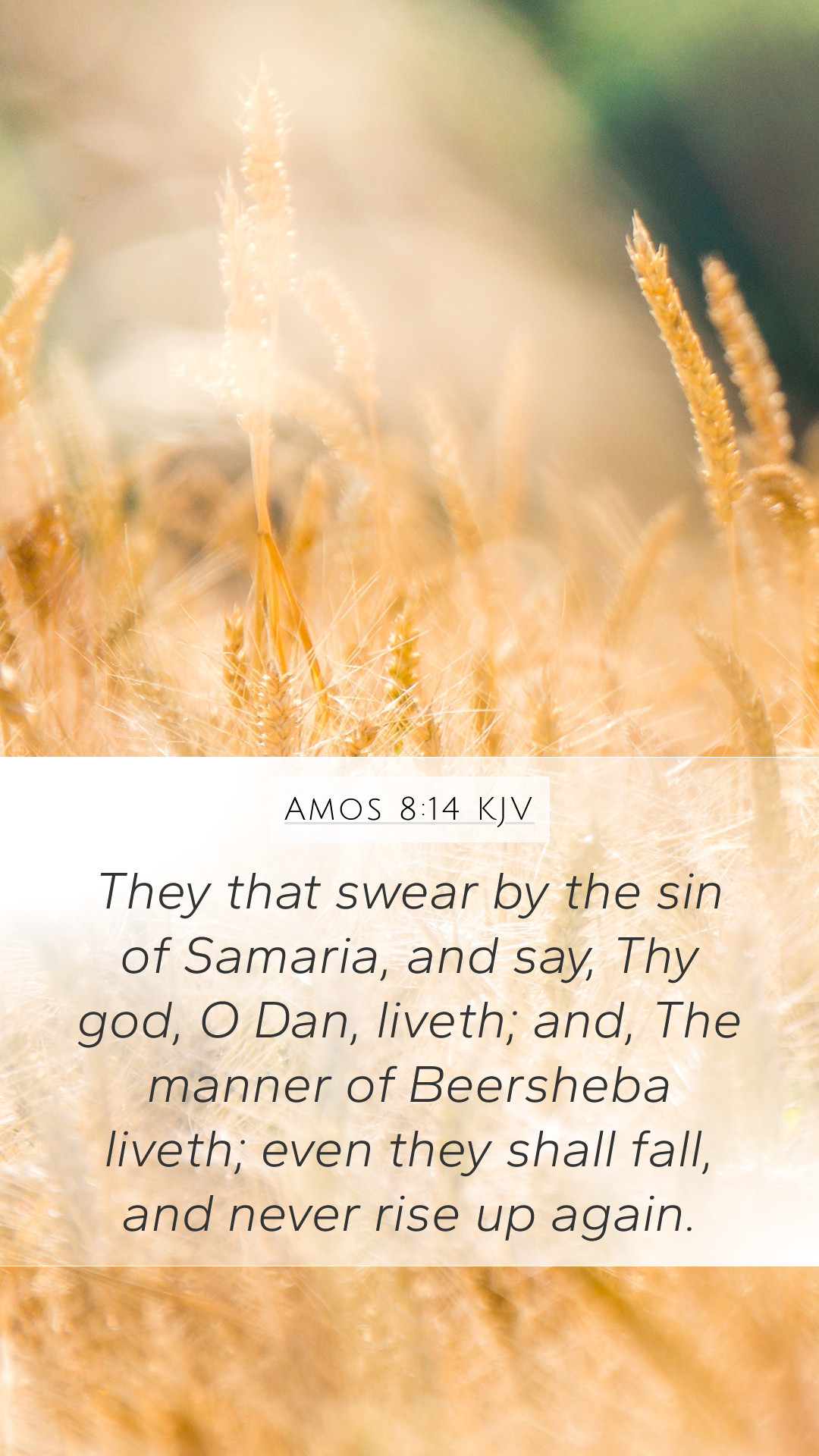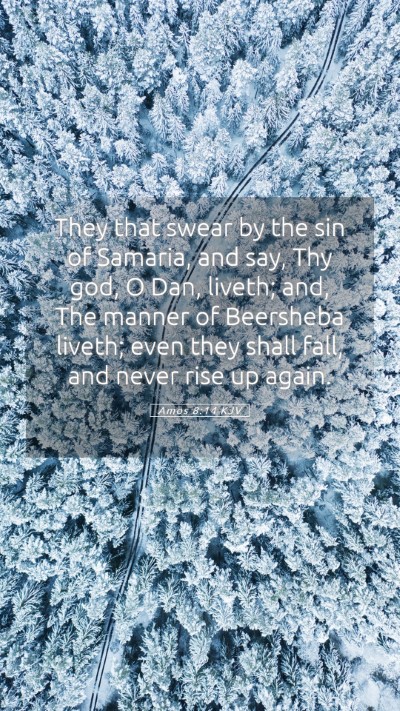Old Testament
Genesis Exodus Leviticus Numbers Deuteronomy Joshua Judges Ruth 1 Samuel 2 Samuel 1 Kings 2 Kings 1 Chronicles 2 Chronicles Ezra Nehemiah Esther Job Psalms Proverbs Ecclesiastes Song of Solomon Isaiah Jeremiah Lamentations Ezekiel Daniel Hosea Joel Amos Obadiah Jonah Micah Nahum Habakkuk Zephaniah Haggai Zechariah MalachiAmos 8:14 Meaning
What is the meaning of Amos 8:14?
They that swear by the sin of Samaria, and say, Thy god, O Dan, liveth; and, The manner of Beersheba liveth; even they shall fall, and never rise up again.
Amos 8:14 Bible Verse Meaning
Understanding Amos 8:14: A Commentary
The verse Amos 8:14 states: "They that swear by the sin of Samaria, and say, Thy god, O Dan, liveth; and, The manner of Beersheba liveth; even they shall fall, and never rise up again." This passage reflects a profound warning to the people of Israel about the consequences of idolatry and false worship.
Verse Context
In this chapter, the prophet Amos addresses the impending judgment on Israel due to their moral corruption and unfaithfulness to God. The sins referenced are a direct indictment of the worship of idols, particularly around the shrines established in Dan and Beersheba.
Insights from Public Domain Commentaries
-
Matthew Henry:
Henry emphasizes that the sin of Samaria corresponds with the spiritual adultery committed by the Israelites. The "sin of Samaria" signifies the idolatrous practices that led the nation away from true worship of Yahweh. He warns that those who put their faith in these false gods will inevitably face divine judgment.
-
Albert Barnes:
Barnes interprets the term "swear by the sin of Samaria" as a representation of loyalty to idolatrous worship. He explains that the people of Israel were misled into believing that their prosperity came from their idols rather than their covenant with God. Their ultimate downfall is a direct result of this misplaced faith.
-
Adam Clarke:
Clarke provides historical context, noting that the idol worship in Dan and Beersheba signifies a departure from proper worship. He points out that their confidence in these monuments of worship is futile and will lead to their spiritual demise, reflecting the broader themes of judgment and accountability found in biblical prophecy.
Meaning of Bible Verses
Amos 8:14 serves as both a warning and a reflection on the importance of authentic faith. The scriptures amplify the notion that mere rituals do not equate to genuine worship. The emphasis on "falling" speaks to spiritual decay—a condition that arises from idolatry, leading to a severed relationship with God.
Application of Amos 8:14 Today
For contemporary believers, this verse highlights the necessity of self-reflection regarding worship practices and the source of one's faith. The challenge remains to choose fidelity to God's commands over societal pressures or material distractions. In studying scripture, it’s crucial to analyze how this verse applies to our lives today, ensuring that we heed the warnings against idolatry in various forms.
Cross References
- Hosea 4:15 - Addresses similar themes of idolatry and spiritual infidelity.
- Jeremiah 2:13 - Highlights abandonment of the living God for broken cisterns.
- Ezekiel 14:3-5 - Discusses the consequences of idol worship among the people.
Importance of Biblical Exegesis
Engaging with the text requires careful analysis that encompasses historical, cultural, and theological dimensions. Understanding difficult Bible passages yields deeper insights into God's character and His plans for humanity. Scholars and laypeople alike benefit from this approach as it enriches personal study and group discussions in Bible study settings.
Conclusion
In summary, Amos 8:14 encapsulates a timeless message about the dangers of straying from authentic faith. By studying this verse and its meanings, believers are called to evaluate their own loyalties and practices. The pursuit of understanding Scripture and engaging with difficult passages deepen one's relationship with God, fostering a more profound application of biblical teachings in everyday life.


